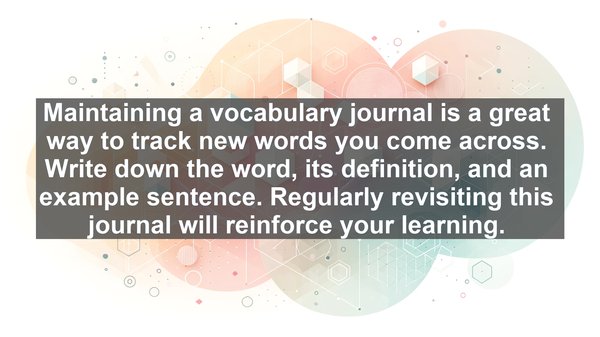Introduction: The Power of Words
Words are the building blocks of communication. The more words you know, the better you can express yourself. Today, we’ll explore 10 effective methods to boost your vocabulary through reading.
1. Contextual Clues: Reading Between the Lines
When you encounter an unfamiliar word, don’t rush to the dictionary. Instead, try to understand its meaning from the context. The surrounding words and phrases often provide valuable hints.
2. Keep a Vocabulary Journal: Your Personal Lexicon
Maintaining a vocabulary journal is a great way to track new words you come across. Write down the word, its definition, and an example sentence. Regularly revisiting this journal will reinforce your learning.
3. Read Diverse Genres: A Treasure Trove of Words
Exploring different genres exposes you to a wide range of vocabulary. Fiction, non-fiction, poetry – each has its unique language. So, don’t limit yourself; venture into various literary realms.
4. Join a Book Club: Learning in a Community
Being part of a book club not only enhances your reading experience but also provides an opportunity to discuss and learn from others. Different perspectives can deepen your understanding of words and their usage.

5. Use Digital Tools: Harnessing Technology
In this digital age, numerous tools are available to aid vocabulary building. Apps, websites, and e-readers often have features like instant definitions and word games. Make the most of them!
6. Read Aloud: Hearing and Seeing in Tandem
When you read aloud, you engage both your visual and auditory senses. This dual stimulation reinforces word retention and pronunciation, making it a valuable technique.
7. Play with Words: Crosswords, Puzzles, and More
Word games are not just fun; they’re educational too. Crosswords, anagrams, and word jumbles challenge your brain and introduce you to new words in an interactive way.
8. Learn Word Roots: Unraveling the Etymology
Many words have roots from ancient languages like Latin and Greek. By understanding these roots, you can decipher the meaning of unfamiliar words and even guess their definitions.

9. Read Regularly: Consistency is Key
Improving your vocabulary is a gradual process. Reading regularly, even if it’s just a few pages a day, ensures a steady exposure to new words and reinforces your learning.
10. Embrace the Dictionary: Your Ultimate Guide
While context clues are valuable, there’s no substitute for a good dictionary. When you encounter a word you can’t fathom, dive into its definition, usage, and even synonyms. A dictionary is a treasure trove of knowledge.
